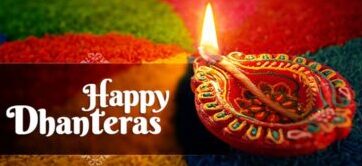Dhanteras also known as Dhanatrayodashi. It is the first day that marks the festival of Diwali.
According to the Hindu calendar month of Kartik, Dhanteras has been celebrated on the thirteenth lunar day of Krishna Paksha. On Dhanteras, Dhanvantari has been workshipped on the occasion of Dhanteras. Dhanvantari has been considered the God of Ayurveda. He imparted the wisdom of Ayurveda for the betterment of mankind and help us to rid of the suffering of disease.
Click Here To Know More About Dhanteras 2020.
The day of Dhanteras has been declared as the National Ayurveda Day by the Indian ministry of Ayurveda, Yoga and Naturopathy, Unani, Sidha and Homeopathy which was first observed on 28 October 2016.
On this day, usually meal of daal baath and malpura has been enjoyed by the Gujarati families to ring in the new year.
How To Celebrate Dhanteras?
At the beginning of celebration of Diwali festival, Vasubaras has been celebrated. On this day, Cow and her calf are worshipped. In Vedic Mythology, Cow holds a very sacred place. Cow is referred as Gua Mata. Cow is worshipped and nurtured on Vasubaras. In all Hindu celebrations, the Gau Mata and her Prasad “Pancha Gavya” or “Pamchamrut” are used. After Vasubaras, Dhanteras has been celebrated.
Lord Dhanvantari
Worship of Lord Dhanvantari is know as Dhanteras. According to Hindu Mythology, Lord Dhanvantari emerged during Samudra Manthan, holding a Kalasha full of Amrit in one hand and the sacred text about Ayurveda in the other hand. Lord Dhanvantari is considered to be the Vaidya of Gods.
Lakshmi Puja
In the evening, the Lakshmi Puja has been performed. All the lamps has been lit and the devotional songs in praise of Goddess Lakhsmi has been sung. A traditional sweets known as Naivedya has been offered to the Goddess. People lightly pound dry coriander seeds with jaggery and offer the mixture as Naivedya performed by the Maharashtra people.
Preparation
Like in Diwali, houses are not on Dhanteras but houses are thoroughly cleansed and whitewashed. The Lord Dhanvantari, who is the god of health and Ayurveda. With colorful lanters, highly lights and traditional motify of Rangoli designs, the main entrance has been decorated to welcome the Goddess of Wealth and Prosperity. Along with this, small footprints are also drawn with rice flour and vermilion powder. In honor of Lakshmi and Dhanvantari, diyas will kept burning for a night.
Buying Gold, Silver And Utensils
Hindus purchase gold or silver articles and new utensils. To purchase metal on that day is believed that it is a sign of good luck. Because of this, Dhanteras become the occasion for buying gold, silver and utensils. Not only gold , silver and utensils, a heavy purchase of appliances and automobiles.
Lighting Lamps And Diyas
From this night, diyas and lamps are lit up everyday. In front of Tulsi plant, diyas has been placed. The day has been aimed to increase wealth and prosperity. Animals are worshipped by the farmers in the village as they are the main source of income for them.
In All Around India
Brahmin women make Marundhu in South India. Marundhu has been offered during the prayer and eaten in the early morning on Naraka Chaturdasi before sunrise. The recipes of Marundhu has been handover from families to their daughters and daughter in law.
Significance Of Dhanteras
Lakshmi came out from the ocean of milk during the churning of the sea on the day of Dhantrayodashi. Due to this Lakshi Goddess is worshiped on the day of Trayodashi.
According to a popular legend, When Devas and Asuras performed the Samudra manthan for Amrita which is nectar of immortality, Dhanvantari who is the physician of the Gods and an incarnation of Vishnu emerged carrying a jar of the elixir on the day of Dhanteras.
Legends
An ancient legend ascribes the occasion to a story about the 16 year old son of King Hima. His death by snake bite was predicted by the horoscope on the fourth day of his marriage. His newly wed wife came with a plan. She laid out all her ornaments and many gold and silver coins at the entrance of the sleeping chamber and lit many lamps. She started singing song and narrated stories and didn’t let her husband fall sleep till next day.
When Yama. the god of Death arrived at the pince’s doorstep in the guise of serpent. His eyes were dazzled and blinded by the light of lamps and the jewellary. Due to this, Yama wasn’t able to enter the Pince’s chamber so he climbed on top of the heap of gold coins. He sat there and listen all the stories and songs. He silently went away in the morning. The young prince was saved from the serpent by the cleverness of his new bride. The day came to be celebrated as Dhanteras.
Naraka Chaturdashi
The following day came to be called Naraka Chaturdashi in which Naraka means hell and Chaturdashi means 14th. It is also known as Yamadeepdaam. It means ladies of the house light earthen lamps or deep and these are kept burning throughout the night glorifying Yama, the God of Death. This is the day before Diwali so it is also called Chhoti Diwali or Minor Diwali.








